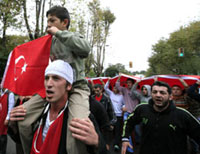USA prevents Turkey from crossing Iraq northern boderline
The U.S. by all means want to prevent Turkey from sending the army across the northern border of Iraq to fight Kurdish rebels. Condoleezza Rice was meeting Friday with Prime Minister Recep Tayyip Erdogan to discuss the question.

Washington worries that such a cross-border incursion would bring instability to what has been the calmest part of Iraq, and could set a precedent for other countries, like Iran , who also have conflicts with Kurdish rebels.
But Ankara has been resolute that it wants to hear concrete measures that the United States will take against the rebel Kurdistan Workers' Party, or PKK, or it will launch an attack.
Before her arrival in the Turkish capital, Rice told reporters on the plane that the United States , Turkey and Iraq would jointly counter the Kurdish rebels, whose attacks against Turkish positions over the last month have left 47 dead, including 35 soldiers, according to government and media reports.
"We have a common enemy and we are going to act as if we have a common enemy, which means that we are going to work with our Turkish allies and the Iraqis" to have an effective way of dealing with the PKK, Rice said.
Many Turks are furious with the United States for its perceived failure to pressure Iraq into cracking down on the PKK, which operates from bases in the semiautonomous northern Kurdish region of Iraq . Street protesters have urged the government to send forces across the border even if it means a deepening of the rift with the U.S. , their Cold War-era ally.
Rice's trip places her in the breach between important NATO ally Turkey , the weak U.S.-backed government in Baghdad and the self-governing Kurds in Iraq 's oil-rich north.
Her agenda includes meetings with Erdogan - who travels to Washington to meet with U.S. President George W. Bush on Monday - and Foreign Minister Ali Babacan.
Babacan on Thursday tried to allay some U.S. fears, saying that if his troops cross the border they would try to avoid confronting the self-governing Kurdish leadership in northern Iraq.
"Any cross-border attack would be aimed at hitting terrorist bases, and would not be an invasion," said Babacan, who has toured the Middle East to seek support from Arab leaders for Turkey's stance.
The "invasion" reference recalled the U.S.-led invasion of Iraq in 2003, a source of tension between Washington and Ankara because Turkey refused to allow U.S. troops to use its territory as a platform for attacking Saddam Hussein. Turkey has also been troubled by the increasingly emboldened Iraqi Kurds following Saddam's ouster, fearing their success will incite separatism among its minority Kurd population.
The PKK, which seeks more rights and autonomy for Turkish Kurds, is labeled a terrorist group by Europe and the United States .
The Iraqi Kurds have warned Turkey against staging a cross-border offensive, saying they will defend their territory against any incursion and suggesting that Turkey 's ulterior goal is to disrupt their virtual mini-state. Turkey is wary of getting bogged down in a conflict that could be militarily inconclusive and politically damaging for a country seeking to burnish its international image by joining the European Union.
Turkish leaders suspect, however, that the administration there is assisting the PKK, or at the very least tolerating its presence at a network of mountain camps.
"We have doubts about the sincerity of the administration in northern Iraq in the struggle against the terrorist organization," Babacan said Thursday. "We want to see solid steps."
Speaking on the plane, Rice said initial three-way cooperation could include better ways of sharing information or means to restrict the rebels' movement. She did not rule out sanctions or other penalties on the PKK, but she did not address whether the Iraqis should pursue their own military raids.
"We'll try to talk through the various elements of a strategy, but we really need to look for an effective strategy, not just one that is going to strike out somehow and still not deal with the problem," she said.
After meetings in Ankara , Rice will travel to Istanbul for a conference on Iraq that is likely to be dominated by talk about the crisis on the Iraqi-Turkish border. Iraqi Prime Minister Nouri al-Maliki is expected to attend. Another delegate, Iranian Foreign Minister Manouchehr Mottaki, arrived Thursday night in Ankara .
U.N. Secretary-General Ban Ki-moon was also coming to Ankara Friday to meet Turkey 's President Abdullah Gul. Ban will later travel to Istanbul to attend the international conference on Iraq on Saturday.
Subscribe to Pravda.Ru Telegram channel, Facebook, RSS!


